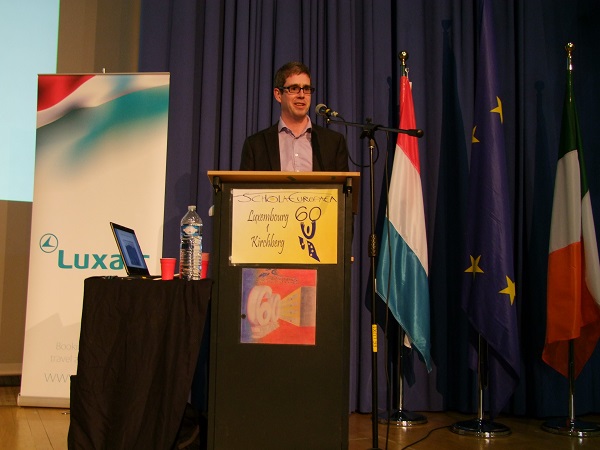
On Wednesday evening, the Salle des Fetes at the European School in Kirchberg was the venue for a lecture forming part of the Luxembourg centenary commemoration of the 1916 Easter Rising, attracting almost 150 people in the process.
Following music and dancing from the Luxembourg branch of Comhaltas Ceolteoiri Eireann, Bryan Rose, in his role as Chairman of the Luxembourg Committee for the 1916 Easter Rising Centenary Commemorations, thanked the sponsors (Kerry Group, Luxair, Hotel Le Royal), Ambassador Carpenter and those involved in the organisation of the event, and introduced the speaker, Dr Fearghal McGarry who comes from Bray, Co wicklow, and lectures at Queens University Belfast.
He started by stating that Irish people now reflect on both the historical aspect of the 1916 Easter Rising, as well as its meaning. He added that people south and north of the border reflect differently, with different interpretations. However, we can relatively easily reconstruct what happened, with figures readily available on how many died as well as who they were. He also discussed how our reflections change over time, with significant differences between the 50th commemoration in 1966 and the centenary in 1916.
He related the events leading up to and during Easter Week in 1916, when 4 groups with different political outlooks - the Irish Citizens Army, the Irish Volunteers, Cumann na Bhan (Irish Women) and the Irish Republican Brotherhood - combined to rise up against British rule. They took over around 5 buildings and waited for the British to come; eventually they held out for 6 days but were outnumbered by around 20,000 British soldiers. 16 leaders were executed out of a total of around 500, and around 2,000 were interred. However, it was the subsequent suppression and oppression that started to turn feelings against the British, leading to the Irish Civil War and eventually independence.
He talked about political feelings in the run up to 1916, with many unhappy with Home Rule. He talked about cultural nationalism which led to radical politics, feeding into militancy in a republican context. The Ulster Volunteers' actions led to the formation of the Irish Volunteers in the south. He stated it was very difficult for the Rising to take place in the run up to the First World World. He also referred to the organisation of a tiny group of conspirators who had no mandate for their actions.
The decision to occupy city centre buildings led to loss of civilian life, with 54% of those killed being civilians. He also referred to the issue of legitimacy on both sides, with the British missing a number of opportunities since the 1880s to implement some form of self-government in Ireland.
The issue of the Rising being violent was also addressed, with some people such as John Bruton on record as saying that the Easter Rising was not necessary and independence was inevitable. Others have made the comparison with other countries' attempts at gaining independence around that time, with some comparisons with the American Civil War, as well as the Boer War.
For some of those fighting, it transpired that some did not even know the leaders behind the Easter Rising. Some were very young and were rebelling against social circumstances, not specifically the British. The numbers of those involved remained small as many involved in the planning felt strongly that there was no hope of success in defeating the British that Easter. As well as radical feelings there was also significant conservatism.
He addressed the role of women in the Easter Rising, not just that of Cumann na Bhan, with many arguing for active roles to play.
Remembering 1916 has always been difficult, even from the first commemoration in 1917 when riots broke out. This year the centenary was commemorated in the south with dignified events; however, in the north, the commemoration was marked by arguments and disagreement.
In 1922, the Irish Free State rooted its legitimacy in the 1916 Easter Rising which was the key event in bringing about independence; however, the Rising was unmandated. So, from the beginning, it has always been a source of anxiety.
In 2016 there is a different view of radicalism st the time, including the significance of feminism. He explained that society changes over time, and so does history, with the 25th anniversary about remembering the military aspect; the 50th anniversary focused on citizenship (however, in the north, loyalist killings stated in 1966); the 75th anniversary he described as a low point with a minimalistic commemoration; the 90th commemoration included a military parade. In 2016 for the 100th commemoration, the government has been careful to present an inclusive memory.
The Luxembourg centenary commemorations of the 1916 Rising continue on Sunday 24 April, with the screening of the film "1916", narrated by Liam Neeson, at the Cinémathèque at 17:00. Some tickets (€3.70) are still available through www.luxembourg-ticket.lu (130+ have been sold to date).
Photos by Geoff Thompson








